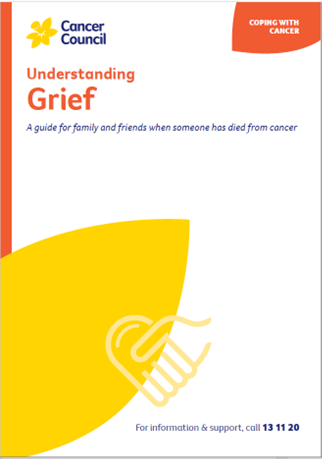- Home
- About Cancer
- Schools and teachers
- Cancer in the school community
- The bereaved school community
- Seeking professional support
Seeking professional support
It is important to understand that bereavement is a process, not a single event, and can take many months or even years. A student or staff member should be referred to professional help if they simply need someone to talk to, but especially if they demonstrate significant changes in behaviour, such as:
- saying they want to die too or becoming extremely preoccupied with dying
- suffering academically or at work for an extended period after the death
- acting sad and withdrawn for an extended period
- increased risk-taking or self-harm
- having trouble socialising.
Talk with your school principal and colleagues about ways to support bereaved members of your school community. If you think that a student needs professional support, consult your school counsellor. Staff who need counselling for themselves may be able to access it through an Employee Assistance Program (EAP) if this is available at your school. Some people may need ongoing support for many months.
You could also contact one of the organisations listed in the table below. These can be good starting points for general advice or for referrals to bereavement counselling.
Bereavement support services
- Australian Centre for Grief and Bereavement – offers online information for people experiencing grief and bereavement
- Cancer Council 13 11 20 – can refer callers to local services or recommend a telephone support group
- CanTeen – offers online information and bereavement support tailored for young people aged 12–24 years
- Griefline – provides community and family services to support all Australians who have encountered a loss
- Redkite – offers bereavement support for families and friends of children and young people aged 0–24 years
- The Compassionate Friends – has member organisations across Australia that offer support to any family that has lost a child
- The National Centre for Childhood Grief – offers counselling for bereaved children aged 3–18
→ READ MORE: More support for students and staff
Podcast: Coping with Grief
Listen to more episodes from our podcast for people affected by cancer
More resources
Claire Tobin, Principal Medical Advisor, Department of Education and Training, VIC; Dr Antoinette Anazodo, Paediatric and Adolescent Oncologist, Sydney Children’s Hospital and Prince of Wales Hospital, Director of The Sydney Youth Cancer Service, and Conjoint Senior Researcher, University of New South Wales, NSW; Lisa Barrow, Clinical Nurse Educator, Children’s Cancer Centre, Royal Children’s Hospital, Melbourne, VIC; Margo Bulic, Psychosocial Support Worker, CanTeen, ACT; Amber Copeland, 13 11 20 Consultant, Cancer Council Queensland; Donna Drew, Clinical Nurse Consultant, Paediatric Oncology/Palliative Care, Kids Cancer Centre, Sydney Children’s Hospital, Randwick, NSW; Allesha Fecondo, Education Consultant, Victorian Paediatric Rehabilitation Service, and Education Liaison, Ronald McDonald Learning Program, Ronald McDonald House Charities Australia, VIC; John Friedsam, General Manager of Divisions, CanTeen Australia, NSW; Pina Hutcheson, President, Catholic Primary Principals’ Association of WA; Cara Irvine, Year 8 Coordinator, Alfred Deakin High School, ACT; Andrew Long, Assistant Director, Policy and Research, Independent Schools Council of Australia, ACT; Dr Alistair Lum, Post-doctoral Research Fellow – Behavioural Sciences Unit, Sydney Children’s Hospital, University of New South Wales, NSW; Kristine Luszczynski, Learning Program Manager, Quality and Standards, Ronald McDonald House Charities Australia, NSW; Anita Neville, National Manager, Ronald McDonald Learning Program, Ronald McDonald House Charities Australia, VIC; NSW Department of Education, NSW; Mandy Roney, Consumer; Shannon Rush, Primary School Program Manager, Camp Quality, SA; Luke Wade, Education and Career Support Consultant, Redkite, QLD.
View the Cancer Council NSW editorial policy.
View all publications or call 13 11 20 for free printed copies.
Need to talk?
Support services
Coping with a loss from cancer?
Speak to a health professional or to someone who has been there, or find a support group or forum
Need legal and financial assistance?
Practical advice and support after a death from cancer
Cancer information
What is grief?
Common grief reactions, such as sadness, anger, relief and fear
Workplace fact sheet: Death and bereavement
Information for employers when a staff member dies or is bereaved

